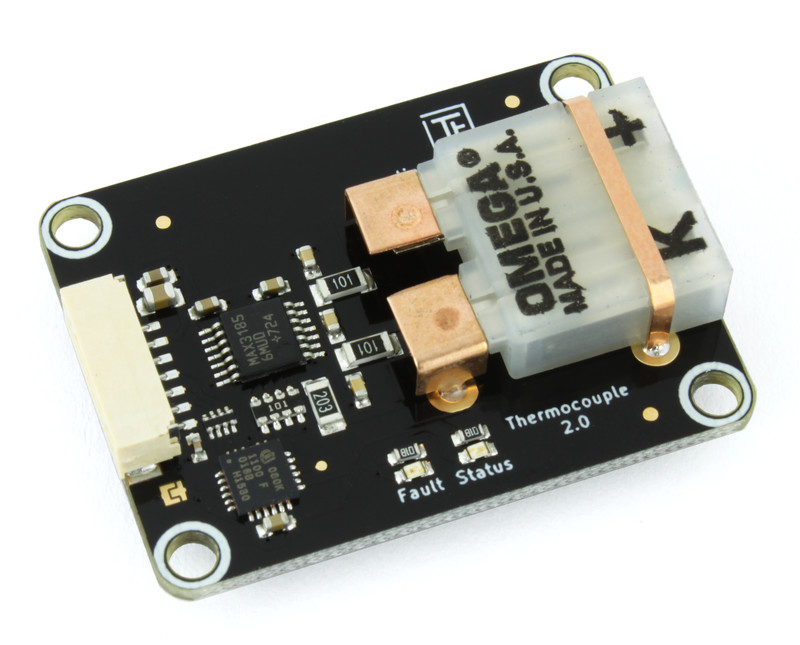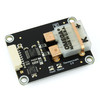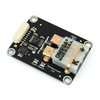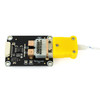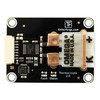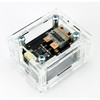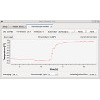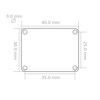- Getting Started
- Hardware
- Bricks
- Bricklets
- Accelerometer Bricklet 2.0
- Air Quality Bricklet
- Ambient Light Bricklet 3.0
- Analog In Bricklet 3.0
- Analog Out Bricklet 3.0
- Barometer Bricklet
- Barometer Bricklet 2.0
- Breakout Bricklet
- CAN Bricklet
- CAN Bricklet 2.0
- CO2 Bricklet 2.0
- Color Bricklet
- Color Bricklet 2.0
- Compass Bricklet
- DC Bricklet 2.0
- Distance IR Bricklet
- Distance IR Bricklet 2.0
- Distance US Bricklet 2.0
- DMX Bricklet
- Dual Button Bricklet 2.0
- Dust Detector Bricklet
- E-Paper 296x128 Bricklet
- Energy Monitor Bricklet
- GPS Bricklet 2.0
- GPS Bricklet 3.0
- Hall Effect Bricklet
- Hall Effect Bricklet 2.0
- Humidity Bricklet 2.0
- IMU Bricklet 3.0
- Industrial Analog Out Bricklet 2.0
- Industrial Counter Bricklet
- Industrial Digital In 4 Bricklet 2.0
- Industrial Digital Out 4 Bricklet
- Industrial Digital Out 4 Bricklet 2.0
- Industrial Dual 0-20mA Bricklet
- Industrial Dual 0-20mA Bricklet 2.0
- Industrial Dual AC In Bricklet
- Industrial Dual AC Relay Bricklet
- Industrial Dual Analog In Bricklet 2.0
- Industrial Dual Relay Bricklet
- Industrial PTC Bricklet
- Industrial Quad Relay Bricklet 2.0
- IO-16 Bricklet
- IO-16 Bricklet 2.0
- IO-4 Bricklet 2.0
- Isolator Bricklet
- Joystick Bricklet
- Joystick Bricklet 2.0
- Laser Range Finder Bricklet 2.0
- LCD 128x64 Bricklet
- LCD 20x4 Bricklet
- LED Strip Bricklet 2.0
- Line Bricklet
- Linear Poti Bricklet
- Linear Poti Bricklet 2.0
- Load Cell Bricklet 2.0
- Motion Detector Bricklet 2.0
- Motorized Linear Poti Bricklet
- Multi Touch Bricklet
- Multi Touch Bricklet 2.0
- NFC Bricklet
- OLED 128x64 Bricklet 2.0
- OLED 64x48 Bricklet
- One Wire Bricklet
- Outdoor Weather Bricklet
- Particulate Matter Bricklet
- Performance DC Bricklet
- Piezo Speaker Bricklet
- Piezo Speaker Bricklet 2.0
- Real-Time Clock Bricklet
- Real-Time Clock Bricklet 2.0
- Remote Switch Bricklet 2.0
- RGB LED Bricklet 2.0
- RGB LED Button Bricklet
- Rotary Encoder Bricklet 2.0
- Rotary Poti Bricklet
- Rotary Poti Bricklet 2.0
- RS232 Bricklet
- RS232 Bricklet 2.0
- RS485 Bricklet
- Segment Display 4x7 Bricklet
- Segment Display 4x7 Bricklet 2.0
- Servo Bricklet 2.0
- Silent Stepper Bricklet 2.0
- Solid State Relay Bricklet 2.0
- Sound Intensity Bricklet
- Sound Pressure Level Bricklet
- Temperature Bricklet
- Temperature Bricklet 2.0
- Temperature IR Bricklet 2.0
- Thermal Imaging Bricklet
- Thermocouple Bricklet 2.0
- Tilt Bricklet
- UV Light Bricklet 2.0
- Voltage/Current Bricklet 2.0
- XMC1400 Breakout Bricklet
- Master Extensions
- Power Supplies
- Discontinued Products
- Timeline
- Software
- Kits
- Embedded Boards
- Specifications
Thermocouple Bricklet 2.0¶
Features¶
Measures temperature with a thermocouple
Supports B, E, J, K, N, R, S and T type
Description¶
The Thermocouple Bricklet 2.0 can be used to extend the features of Bricks with the capability to measure temperature with a thermocouple. The measured temperature can be read out in °C. With configurable events it is possible to react on changing values without polling.
The supported thermocouple types are B, E, J, K, N, R, S and T. It is also possible to configure custom gains, with which you can read out other thermocouple types or even custom thermocouple types.
Faults such as missing thermocouple and over/under-voltage are automatically detected and reported.
By default the Bricklet comes with a K-type mini thermocouple connector. The connector uses Alumel for the negative Chromel for the positive contact. We can also fit the Bricklet with a matching connector for other thermocouple types. You can choose type J,T,E,U and N. Another option is to choose the wire option. Then you will get the Bricklet without any connector but with two 20cm isolated wires. This way you can connect your own connector to it.
This Bricklet ist not galvanically isolated to the Tinkerforge system. This means that there is a direct electrical connection between the terminals of the Bricklet and the rest of the system. Dependent of the application this can lead to undesired connections, ground loops or short circuits. These problems can be prevented by using the Bricklet together with a Isolator Bricklet.
Technical Specifications¶
Property |
Value |
|---|---|
Sensor |
MAX31856 |
Current Consumption |
45mW (9mA at 5V) |
Measurement Range |
-210°C to +1800°C |
Resolution |
0.01°C |
Accuracy |
±0.15% (full-scale), ±0.7°C (cold-junction) |
Supported Types |
B, E, J, K, N, R, S and T (custom types possible) |
Connector |
mini thermocouple jack |
Dimensions (W x D x H) |
40 x 30 x 8mm (1.58 x 1.18 x 0.32") |
Weight |
9g |
Resources¶
Test your Thermocouple Bricklet 2.0¶
To test a Thermocouple Bricklet 2.0 you need to have Brick Daemon and Brick Viewer installed. Brick Daemon acts as a proxy between the USB interface of the Bricks and the API bindings. Brick Viewer connects to Brick Daemon. It helps to figure out basic information about the connected Bricks and Bricklets and allows to test them.
Connect the Thermocouple Bricklet 2.0 to a Brick with a Bricklet Cable as well as a thermocouple to the Thermocouple Bricklet.
If you connect the Brick to the PC over USB, you should see a new tab named "Thermocouple Bricklet 2.0" in the Brick Viewer after a moment. Select this tab. If everything went as expected the Brick Viewer should look as depicted below.
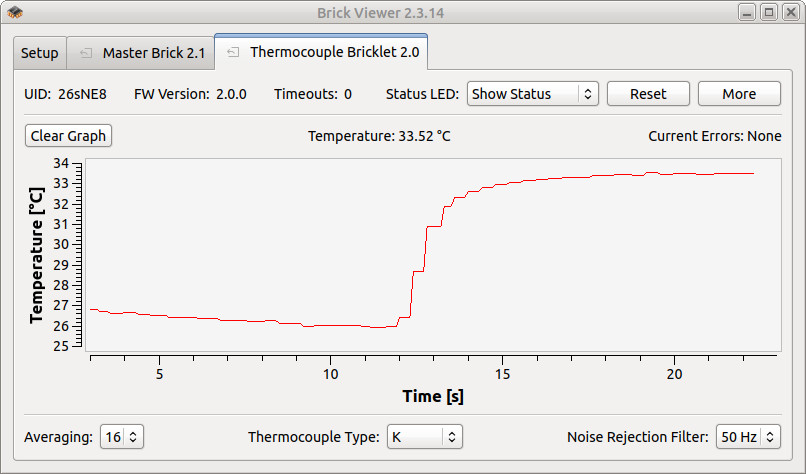
After this test you can go on with writing your own application. See the Programming Interface section for the API of the Thermocouple Bricklet 2.0 and examples in different programming languages.
Case¶
A laser-cut case for the Thermocouple Bricklet 2.0 is available.
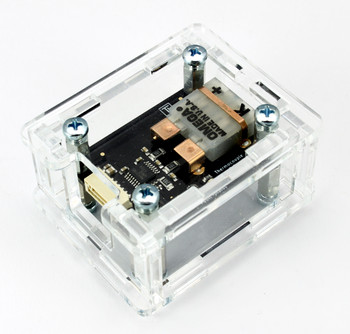
The assembly is easiest if you follow the following steps:
Screw spacers to the Bricklet,
screw bottom plate to bottom spacers,
build up side plates,
plug side plates into bottom plate and
screw top plate to top spacers.
Below you can see an exploded assembly drawing of the Thermocouple Bricklet 2.0 case:
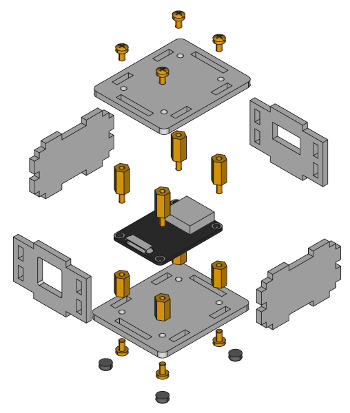
Hint: There is a protective film on both sides of the plates, you have to remove it before assembly.
Thermocouple types¶
Different thermocouple types use different types of metals for their wires. Optimally, the connector on the Bricklet uses the same types of metals.
By default the Bricklet comes with a K-type mini thermocouple connector (Alumel for the negative and Chromel for the positive contact). You can connect any type of thermocouple to the Bricklet too, but with a slight increase in error. If you want to use a non-K-type thermocouple and you need the best possible performance we can fit the Bricklet with different connectors for you:
Type |
Negative Contact |
Positive Contact |
|---|---|---|
B |
Platinum/Rhodium |
Platinum/Rhodium |
E |
Constantan |
Chromel |
J |
Constantan |
Iron |
K |
Alumel |
Chromel |
N |
Nisil |
Nicrosil |
R |
Platinum |
Platinum/Rhodium |
S |
Platinum |
Platinum/Rhodium |
T |
Constantan |
Copper |
In our shop different connectors can be chosen. If the necessary connector can't be selected, please contact us before your order.
Programming Interface¶
See Programming Interface for a detailed description.
Language |
API |
Examples |
Installation |
|---|---|---|---|
C/C++ |
|||
C/C++ for Microcontrollers |
|||
C# |
|||
Delphi/Lazarus |
|||
Go |
|||
Java |
|||
JavaScript |
|||
LabVIEW |
|||
Mathematica |
|||
MATLAB/Octave |
|||
MQTT |
|||
openHAB |
|||
Perl |
|||
PHP |
|||
Python |
|||
Ruby |
|||
Rust |
|||
Shell |
|||
Visual Basic .NET |
|||
TCP/IP |
|||
Modbus |


